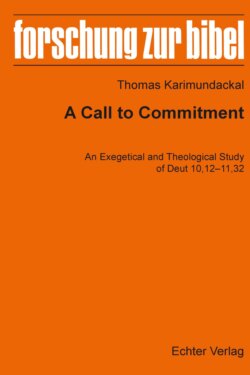Читать книгу A Call to Commitment - Thomas Karimundackal - Страница 6
На сайте Литреса книга снята с продажи.
ОглавлениеCONTENTS
PREFACE
INTRODUCTION
1. Choice of the subject
2. Why this pericope?
3. Goal of the study
4. Methodology and areas of the research
5. Itinerary of the study
CHAPTER 1
APPROACHING THE TEXT
1. The delimitation of the examined text
1.1 Deut 10,12 - the beginning of the fifth parenesis
1.2 Deut 11,32 - the end of the fifth parenesis
1.3 Internal coherence of the unit
2. The context of Deut 10,12-11,32
2.1 The preceding context
2.1.1 Israel’s self-righteousness and Yhwh’s grace
2.1.2 Israel’s faithlessness and Yhwh’s faithfulness
2.1.3 Resumption of Israel’s journey
2.1.4 Explicit connections between 9,1-10,11 and 10,12-11,32
2.2 The succeeding context
2.2.1 Explicit connections between 10,12-11,32 and 12,1-31
2.2.2 Distinguishing characteristics of Deut 12,1-13,1
2.2.3 Conclusion
3. Translation and text-critical notes on the text
3.1 Qumran Manuscripts
3.2 Translation and textual notes
3.3 Observations on the MT and the Smr
3.3.1 Harmonizing alterations
3.3.2 Alterations related to content and ideology
3.3.3 Linguistic corrections
3.3.4 Orthographical changes
3.3.5 Alterations by the omission of words
3.4 Observations on the MT and the LXX
3.4.1 Harmonizing alterations
3.4.2 Theological interpretation
3.4.3 Alterations by additions
3.4.4 Linguistic corrections
3.5 Observations on the MT and the Qumran texts
3.5.1 Orthographical changes
3.5.2 Harmonizing alterations
3.5.3 Resemblance to the LXX and the Smr
3.5.4 Alterations by addition/omission of words and linguistic correction
3.5.5 Variations among the Qumran manuscripts
3.6 Conclusion
CHAPTER 2
THE STRUCTURE AND DYNAMICS OF DEUT 10,12-11,32
1. The structure of Deut 10,12-11,32
1.1 Criteria for textual division
1.2 Structural division of Deut 10,12-11,32
1.2.1 Space
1.2.2 Time
1.2.3 Persons
1.2.4 Communication
1.2.5 Vocabulary
1.3 A closer look at the sub-sections
1.3.1 Deut 10,12-22: Israel’s need for a Yhwh-centred existence
1.3.2 Deut 11,1-7: Israel’s challenge for a Yhwh-centred existence
1.3.3 Deut 11,8-17: Israel’s prospect for a Yhwh-centred existence
1.3.4 Deut 11,18-25: Israel’s accountability for a Yhwh-centred existence
1.3.5 Deut 11,26-32: Israel’s choice for a Yhwh-centred existence
1.4 Proposed structural outline of Deut 10,12-11,32
2. The Dynamics of Deut 10,12-11,32
2.1 The beginning and the end
2.2 Temporal movement
2.3 Spatial movement
2.4 Character movement
2.4.1 God
2.4.2 Israel
2.5 Repetition and intensification
2.6 Thematic movement
2.7 Conclusion
CHAPTER 3
ANALYSIS AND INTERPRETATION OF THE TEXT
1. Deut 10,12-22: Israel’s need for a Yhwh-centred existence
1.1 Deut 10,12-13: Requirements for a Yhwh-centred existence
1.1.1 Deut 10,12-13 in the Parenesis (Deut 6-11)
1.1.2 What does the Lord your God demand from you? (v12ab)
1.1.3 Principles of a Yhwh-centred existence
1.2 Deut 10,14-15: Yhwh’s sovereignty and his elective grace
1.2.1 Sovereignty of the Lord over the universe
1.2.2 Yhwh’s elective grace upon Israel
1.3 Deut 10,16: Circumcise your heart
1.3.1 Circumcise the foreskin of your heart
1.3.2 Stiffen your neck no more
1.4 Deut 10,17-18: Yhwh’s uniqueness and sovereignty
1.5 Deut 10,19-20: Love the sojourner and commit yourself to the Lord
1.6 Deut 10,21-22: Yhwh’s uniqueness and his mighty deeds
2. Deut 11,1-7: Israel’s challenge for a Yhwh-centered existence
2.1 Deut 11,1: Love the Lord and keep his charges
2.2 Deut 11,2-7: To know the mighty deeds of the Lord
2.2.1 Structure and syntax of 11,2-7
2.2.2 You shall know today for it is not your children … (v2ac)
2.2.3 Deut 11,2d-3a: Yhwh’s greatness and primacy
2.2.4 Deut 11,3b-7: Yhwh’s redemptive grace and judgment
3. Deut 11,8-17: Israel’s prospect of a Yhwh-centred existence
3.1 Deut 11,8-12: Obedience and the gift of the land
3.1.1 Deut 11,8-9: Obedience and long life in the land
3.1.2 Deut 11,10-12: Description of the land
3.2 Deut 11,13-15: Obedience and prosperity in the land
3.3 Deut 11,16-17: Warning against apostasy
4. Deut 11,18-25: Israel’s accountability for a Yhwh-centred existence
4.1 Deut 11,18-21: Regular instructions of the law
4.2 Deut 11,22-25: Keep the commandments and possess the land
5. Deut 11,26-32: Israel’s choice of a Yhwh-centred existence
5.1 Deut 11,26-28: Choice of blessing and curse
5.2 Deut 11,29-32: Yhwh’s giving of the land and Israel’s response.
5.2.1 Deut 11,29-31: Ceremonial blessing and curse
5.2.2 Deut 11,32: Final appeal to observe the commandments
CHAPTER 4
THEOLOGICAL SYNTHESIS AND ACTUALIZATION OF DEUT 10,12-11,32
1. Deut 10,12-11,32 as a summation of Deut 1,1-10,11 and a link to Deut 12,1-34,12
1.1 Common elements
1.2 The expressions unique to Deut 10,12-11,32 and their significance
1.3 Conclusion
2. Deut 10,12-11,32: a key to the theology of Deuteronomy
2.1 The incomparable Yhwh – the portrait of Yhwh ,
2.1.1 Deut 10,12-22: a sovereign - just - unique Yhwh
2.1.2 Deut 11,1-7: a great redeemer Yhwh
2.1.3 Deut 11,8-17: a caring, ‘angry’ Yhwh
2.1.4 Deut 11,18-25: a mighty - fearsome Yhwh
2.1.5 Deut 11,26-32: a faithful Yhwh
2.1.6 Conclusion
2.2 Israel – a chosen people
2.2.1 Israel – Yhwh’s chosen people
2.2.2 Israel – a people called upon to make a commitment to Yhwh
2.2.3 Conclusion
2.3 The land as the gift of Yhwh: the land in Deut 10,12-11,32
2.3.1 The land belongs to Yhwh
2.3.2 The land as a gift of Yhwh
2.3.3 The land as a fulfilment of the promise to the fathers
2.3.4 The land as a gift in return for allegiance to Yhwh
2.3.5 The land as a good and prosperous land
2.3.6 The land as an object of Yhwh’s special care
2.3.7 Conclusion
2.4 The law and obedience as requirement of a Yhwh-centred existence
2.5 Justice as the expression of a ‘just’ Yhwh
2.6 Blessing or curse – a choice to be made
2.8 Worship of Yhwh - a manifestation of true allegiance to Yhwh
2.9 Conclusion
3. Actualization: theological implications of Deut 10,12-11,32
3.1 Cherishing the Divine-human relationship
3.2 Sharing the resources of the earth
3.3 Be compassionate to the needy and the disadvantaged
ABBREVIATIONS
BIBLIOGRAPHY
